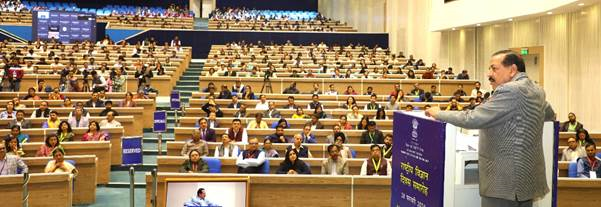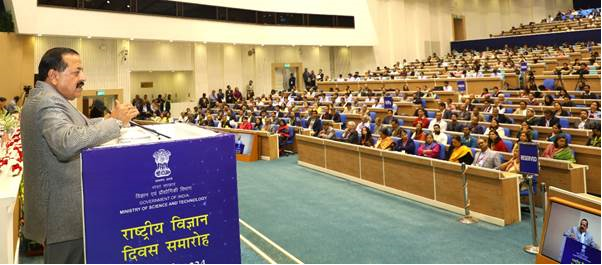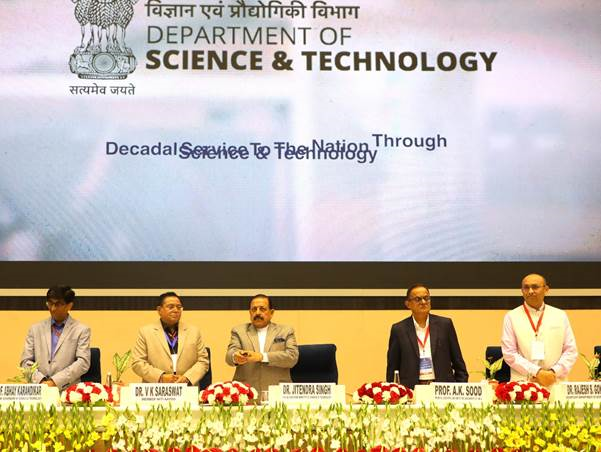Union Minister Dr. Jitendra Singh addressing the "National Science Day 2024" programme at Vigyan Bhawan, New Delhi on Wednesday.
India has conducted the first human clinical trial of gene therapy for haemophilia A (FVIII deficiency) at Christian Medical College (CMC) Vellore.
This was disclosed here today by Union Science & Technology Minister (Independent Charge) Dr. Jitendra Singh while addressing the "National Science Day 2024" programme in Vigyan Bhavan.
Dr Jitendra Singh further informed that the programme is supported by the Department of Biotechnology, the Centre for Stem Cell Research - a unit of InStem Bengaluru, in collaboration with Emory University, USA at Christian Medical College, Vellore. The trials involved deploying a novel technology of using a lentiviral vector to express a FVIII transgene in the patient’s own haematopoietic stem cell which will then express FVIII from specific differentiated blood cells.
The Minister expressed the hope that manufacturing of this vector will commence soon in India and proceed with further clinical trials.

Stating that the National Science Day commemorates the discovery of "Raman Effect" by Nobel Laureate Sir CV Raman, Dr Jitendra Singh recalled C.V. Raman's words that India could progress only through science, more science and still more science, and said that after Prime Minister Shri Narendra Modi took over, India is truly under the "Raman Effect" as PM Modi accords very high priority to science and keeps reiterating that science and technology are imperative to achieve the goal of Viksit Bharat.
Highlighting India’s giant strides in S&T under PM Modi, the Union Minister of State (Independent Charge) Science & Technology; MoS PMO, Personnel, Public Grievances, Pensions, Atomic Energy and Space said India's bio-economy has grown 13 folds in the last 10 years from $10 billion in 2014 to over $130 billion in 2024.
“India is ranked as the world’s 3rd largest Startup Ecosystem with more than 100 unicorns and Incubators under DST are providing job opportunities to nearly 1.5 lakh youth. The Aroma Mission and Purple Revolution are examples of Agricultural transformation through science, innovation and technology which also gave a new avenue for Agri-startups,” he said.

Speaking on India’s efforts in Advanced Technologies, Dr. Jitendra Singh said “India is ready to match the global standards in Quantum Technology, Artificial Intelligence and Machine Learning. He said, we are not only on the same page but in some ways even ahead of others”. He further shared that to enhance the effectiveness of AI, we are also using human interface at different levels.
On increasing role of women scientists due to equal opportunity in S&T, Dr Jitendra Singh categorically mentioned that the women scientific community has been empowered under PM Modi as many of the Scientific Institutions and programmes, including Space Missions, are women-led.
Dr. Jitendra Singh also expressed his confidence in the Anusandhan National Research Foundation that it will prove to be a boon for research and development as the Government has taken efforts to make it a comprehensive forum not only of scientists and industry but also researchers from social sciences and humanities.
Dr. Jitendra Singh said that in the wake of recent scientific achievements, it may be underscored that the rising trajectory of India over the past 10 years is being witnessed globally.
“We are globally among the top five countries in scientific research publications, 40th in Global Innovation Index (GII) showcasing remarkable climb from 81st rank in 2015 and our patent filing has crossed 90,000 which is highest in two decades,” he said.
“All this is due to strengthening of S&T ecosystem in the country under PM Modi in fields such as Artificial Intelligence, Astronomy, Solar & Wind Energy, Semiconductors, Climate Research, Space Research and Biotechnology. Indian scientific breakthroughs have reached from the lab to moon; with the successful landing of Chandrayaan-3 on south pole of moon, India became the first country to achieve this feat,” he said.

On the occasion, Dr Jitendra Singh unveiled a compendium of SATHI Clusters by felicitating heads of IIT Hyderabad, BITS Pilani, ICT Mumbai etc. He also released a White paper on ‘Evolution: Catalysing technology led ecosystem for Bharat e-Mobility.
Speaking on the occasion, Dr. V.K Saraswat, Member Niti Aayog shared that currently 15 companies are producing Bullet proof vests for our soldiers using indigenous technology as PM Modi has said no soldier should martyr due to lack of Bullet proof vest.
In his address, Prof. A.K. Sood, Principal Scientific Adviser, Government of India shared that RUTA i.e. Rural Technology Action Group – recognises potential in rural India to foster innovation at ground level in rural areas.
Addressing the gathering, Professor Abhay Karandikar, Secretary DST said, “it is clearly evident that our scientific endeavours have the power to shape not only the future of our nation but also contribute significantly towards global advancement”.
Dr Rajesh Gokhale, Secretary, Department of Biotechnology (DBT), Dr Kalaiselvi, DG-CSIR, Dr. Rashmi Sharma, Head, NCSTC, DST also addressed the function.
The National Science Day (NSD) is celebrated every year on 28 February to commemorate the discovery of the ‘Raman Effect’. The Government of India designated 28 February as National Science Day (NSD) in 1986. On this day Sir C.V. Raman announced the discovery of the 'Raman Effect' for which he was awarded the Nobel Prize in 1930. On this occasion, theme-based science communication activities are carried out all over the country. The theme for National Science Day 2024 was ‘Indigenous Technologies for Viksit Bharat’.






























